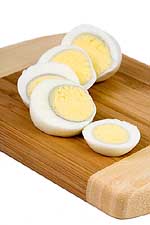| Home A B C D E F G H I J K L M N O P Q R S T U V W X Y Z |
|
Home |
Cholesterol FactsAvoiding Cholesterol in Foods Won't
|
||
|
|

If you avoid all foods that contain cholesterol, will your high cholesterol return to normal?
It's not that simple. Your blood cholesterol level is influenced far more by how many calories and how much saturated and partially hydrogenated fat you eat, than by how much cholesterol is in your food. Cholesterol is found only in foods from animals, such as meat, fish, chicken, dairy products and eggs. It is not found in plants. More than 80 percent of the cholesterol in your body is made by your liver. Less than 20 percent comes from the food that you eat. When you eat more cholesterol, your liver makes less.
Your liver makes cholesterol from saturated fats, which are found in most foods but are concentrated in meat, poultry and whole-milk dairy products. The saturated fat is broken down by your liver into acetone units. If you are not taking in too many calories, your liver uses the acetone units for energy, but if you are taking in more calories than your body needs, your liver uses these same acetone units to manufacture cholesterol. That explains why eating two eggs a day does not raise blood cholesterol levels in the average American. They are already taking in so much cholesterol from meat, fish and chicken and dairy products, that when they take in more, they absorb less.
The average North American takes in 350 mg per day of cholesterol. If he takes in 26 mg per day, he absorbs 41 percent. When he takes in 188 mg cholesterol per day, he absorbs only 36 percent, and when he takes in 421 mg per day (the equivalent of two eggs), he absorbs only 25 percent. Some people absorb more than five times as much as other people at the same intake. So you lower blood cholesterol levels far more effectively by eating less food, less saturated fat and less partially hydrogenated fats than by avoiding foods that contain cholesterol.
About The Author
Dr. Gabe Mirkin has been a radio talk show host for 25 years and practicing physician for more than 40 years; he is board certified in four specialties, including sports medicine. Read or listen to hundreds of his fitness and health reports at http://www.DrMirkin.com
| OTHER RESOURCES: Cholesterol Cholesterol Explained The Cholesterol Myths |
|
Glossary References Links Contact
|